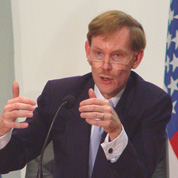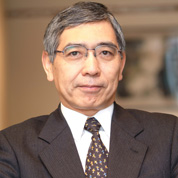Key development banks step up fight against corruption across the globe

The signatories to the new accord included representatives of the African Development Bank Group, the Asian Development Bank, the European Bank for Reconstruction and Development (EBRD), the Inter-American Development Bank Group and the World Bank Group (WB).
Such actions fr om banks that play pacesetter roles in the global and their respective continental banking industries are, by extrapolation, expected to have far-reaching consequences against corruption on all the continents not only in projects run by the MDBs directly and/or in conjunction with local partners on the international markets, but also by the other leading financial and investment institutions.
This because it is hoped that banks that are currently non-signatories to pact would not like to be associated with companies and individuals sanctioned by the MDBs for gross corruption charges and/or condone and promote operations of companies with questionable reputations by investing in their activities.
The new pack’s main novelty
The major novelty in the new joint sanctions accord is the provision for a cross debarment, a new enforcement tool, which the signatories hope will greatly increase the overall effectiveness of the penalties for companies and individuals engaging in fraud and corruption on national, regional and global scales, thus acting as strong deterrent to others. MDBs participating in the agreement will continue to manage their independent strategies to deter and prevent fraud and corruption in their projects. However, the new agreement offers an opportunity to deepen the cooperation between participating MDBs on fraud and corruption risk management.
“The cross-debarment agreement among development banks has sent an unambiguous message on the signatories’ willingness to continue their relentless fight against fraud and corruption.”
Thus, under the new accord, the sanctions by MDBs against individuals and corporations guilty of involvement in fraudulent and corrupt practices will typically include issuance of reprimands, stiffening conditions for securing future contracts with the signatories to the agreement, or debarment. This implies declaring a company or individual ineligible to participate — either for a period of time or permanently — in any future activities bankrolled by the accord signatories. The public debarment, which carries both financial and reputational risks, is considered a major deterrent to future wrongdoing, because under the new agreement, entities debarred by one MDB will be sanctioned for the same misconduct by other participating banks.
The collective enforcement action in the new accord validates the institutions’ Sept. 17, 2006 commitment as part of the International Financial Institutions Anti-Corruption Task Force. The 2006 Accord committed MDBs to further explore how compliance and enforcement actions taken by one institution could be mutually recognized. Under the 2006 agreement, the institutions agreed to harmonize their definitions of sanctionable practices and share greater investigative information among the pact participants. Cross debarment, combined with greater information sharing and coordinated investigations, should allow the institutions to more robustly prevent, detect, and deter corruption. A strong, symmetrical and coordinated approach can also show partner governments and private sector firms that each institution is maintaining the same high standards.
Highlighting the overall importance of the principle of collective punishment against fraudsters, Luis Alberto Moreno, president of the Inter-American Development  Bank Group (IADB), one of the key sources of multilateral financing landmark investment projects in Latin America, noted that a unified action is critical to the success of the industry’s shared effort to fighting corruption and preventing it from undermining development effectiveness in the world. “Cross-sanctioning, combined with greater information sharing and coordinated investigations, should allow our institutions to more robustly prevent, detect, and deter corruption,” he added.
Bank Group (IADB), one of the key sources of multilateral financing landmark investment projects in Latin America, noted that a unified action is critical to the success of the industry’s shared effort to fighting corruption and preventing it from undermining development effectiveness in the world. “Cross-sanctioning, combined with greater information sharing and coordinated investigations, should allow our institutions to more robustly prevent, detect, and deter corruption,” he added.
A similar view on the new pact was offered by Donald Kaberuka, the president of the African Development Bank (AfDB), whose key stated mission objective is to spur sustainable economic development and social progress in its regional member countries, thus contributing to poverty reduction in Africa. “The shared and cooperation efforts envisaged by the new agreement will ensure much higher development effectiveness through sanctioning entities and individuals found to have engaged in fraud and corruption from benefitting from resources meant for development and poverty alleviation across the world,” he added. “It will ensure further that the deterrence efforts targeting both the supply and demand side of corruption are effective.”
The EBRD president, Thomas Mirow, was equally effusive in his praise for the new pact, noting that the enhanced cooperation among the MDBs means taking the ongoing fight against fraud and corruption on the global marketplace to a new level. The EBRD is focused on helping build market economies and democracies in countries in Central Europe to Central Asia in line with its key strategic mission of helping former communist countries in their transitions to capitalism and creation of flourishing private sectors in the region. “Dealing resolutely with corruption is key to the development of sustainable economies that will attract investment and engender confidence. This is a very important step,” Mirow added.
Deterrent action critical to success of development effectiveness
The signatories to the new agreement see the new focus on stepping up the deterrent actions and other related measures against potential fraudsters and corrupt corporate and individual entities as highly critical to the overall success of the ongoing global efforts to fight corruption and prevent it from undermining development effectiveness of projects aimed at boosting prosperity by reducing poverty and other negative social trends in the world. “A unified and coordinated approach to combating fraud and corruption will help the support provided by the MDBs around the world to reach its intended beneficiaries, thus maximizing the development effectiveness of our collective efforts to alleviate poverty and ensure sustainable economic growth worldwide," noted Haruhiko Kuroda, the president of the Asian Development Bank, a regional multilateral development financial institutions established to promote economic and social development aimed at improving the welfare of people in Asian and Pacific countries through loans and technical assistance, as it pursues its main policy mission of creating a region free of poverty.
The management of the European Investment Bank (EIB), which hosted the signing event in Luxemburg, praised the agreement for its multi-pronged attacks on fraudulent practices and noted the EIB’s commitment to the fight against corruption and the cross-debarment clause in the pact signed by the MDBs. “As the bank of the European Union, the EIB will examine how to join the new accord while respecting the EU legal framework in which it operates,” Philippe Maystadt, the bank’s president, noted. “In the meantime, the EIB will endeavor in its own debarment policy to take fully into account the decisions taken by the other MDBs.”












 Web design,
Web design,